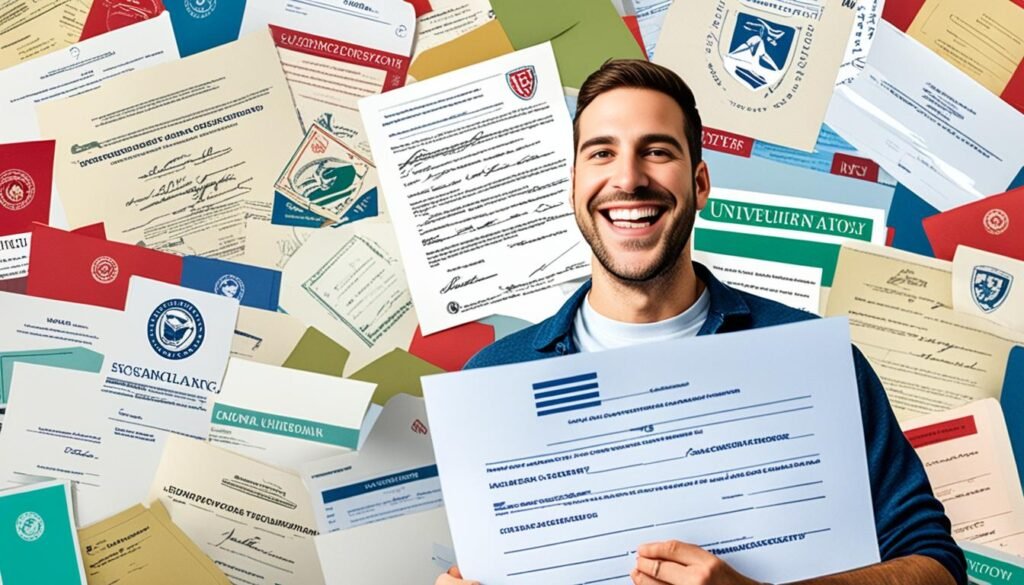Are you a student seeking financial aid for your university education? Look no further! This ultimate guide will provide you with valuable strategies and tips on how to apply for university scholarships, ensuring you have the best chance of receiving the financial support you need to pursue your dreams.
Key Takeaways:
- Millions of dollars in financial aid are awarded through university scholarships every year.
- Applying for scholarships can help you cover the cost of tuition and reduce reliance on student loans.
- Start the scholarship application process early and stay organized to meet deadlines.
- Utilize various resources to find scholarship opportunities, including online databases and local organizations.
- Write a compelling scholarship essay that showcases your achievements and goals.
Why Scholarships Matter
Scholarships are a valuable form of financial aid that can make a significant difference in a student’s ability to pay for college. Unlike student loans, scholarships do not have to be repaid, which makes them an attractive option for many students and their families. By receiving scholarship money, students can reduce their reliance on loans and graduate with less debt, providing a solid financial foundation for their future.
One of the main benefits of scholarships is that they help cover the cost of tuition and other college expenses. Tuition fees can be a significant financial burden, and scholarships provide opportunities for students to receive funding based on a variety of criteria. Academic achievement, talents, extracurricular involvement, leadership potential, and community service are just a few examples of the qualifications that scholarship providers often consider. Whether it’s a merit-based scholarship or one based on specific interests or demographics, scholarships open doors to educational opportunities that may have otherwise been financially out of reach.
By securing scholarships, students can also gain access to scholarship money that can be used for various expenses, such as textbooks, housing, meal plans, and transportation. These additional funds can alleviate the financial stress on students and allow them to focus more on their studies and personal development.
Furthermore, scholarships provide recognition and validation for a student’s hard work and achievements. When students are awarded scholarships, it serves as a testament to their dedication, potential, and abilities. Scholarships not only validate a student’s accomplishments but also provide a sense of pride and motivation to strive for further success.
“Receiving a scholarship was a game-changer for me. It gave me the opportunity to attend my dream college without worrying about how I would pay for it. It also allowed me to focus on my studies and get involved in extracurricular activities without the burden of excessive student loans.” – Emma Johnson, Scholarship Recipient
Reducing the Burden of Student Loans
Student loans often come with high-interest rates and can take years, if not decades, to pay off. By receiving scholarships, students can significantly reduce their reliance on loans for financing their education. This allows them to start their professional lives with less debt and more financial freedom.
A study conducted by the Institute for College Access & Success (TICAS) found that 65% of college seniors who graduated from public and private nonprofit colleges in 2019 had student loan debt. The average debt amount for these graduates was $28,950. By securing scholarships, students can potentially lessen or even eliminate this burden, enabling them to make more informed career choices and pursue their passions rather than being solely driven by the need to repay loans.
The Impact of Scholarships on College Access and Equity
Scholarships also play a vital role in promoting college access and equity. They provide opportunities for students from diverse backgrounds, regardless of their socioeconomic status, to pursue higher education. Scholarships can help level the playing field, allowing talented students who may face financial barriers to access the same educational opportunities as their more privileged peers.
The availability of scholarships encourages students to aim higher and strive for academic excellence. Scholarships motivate and reward students’ hard work and achievements, enabling them to overcome financial obstacles and pursue their educational goals. Scholarships help create a more inclusive and diverse educational landscape by offering equal opportunities to students from all walks of life.
“As a first-generation college student, scholarships made my dreams of a college education a reality. They provided me with the financial support I needed to afford tuition and cover other expenses. Scholarships not only helped me financially but also gave me the confidence to pursue my passion and make the most of my college experience.” – Alejandro Garcia, Scholarship Recipient
| Scholarship Opportunities | Financial Aid | Pay for College | Scholarship Money |
|---|---|---|---|
| Merit-Based Scholarships | Grants | Work-Study Programs | Tuition Assistance |
| Need-Based Scholarships | Federal Student Aid | Parent Contributions | Living Expenses |
| Specialized Scholarships | Scholarship Foundations | Part-Time Jobs | Textbooks and Supplies |
| Athletic Scholarships | Scholarship Databases | Savings | Travel and Transportation |
When to Apply for Scholarships
When it comes to applying for scholarships, timing is everything. It’s crucial to start the scholarship application process early to ensure you have ample time to research and apply for scholarships. By starting early, you can maximize your chances of receiving scholarship funding and alleviate some of the stress associated with meeting deadlines.
Scholarship Deadlines:
One of the most important aspects of the scholarship application process is keeping track of scholarship deadlines. Scholarship deadlines can vary throughout the year, with some scholarships having early deadlines and others accepting applications year-round. It’s essential to stay organized and create a schedule to ensure that you submit your applications on time.
Scholarship Opportunities:
There are numerous scholarship opportunities available, ranging from merit-based scholarships to scholarships based on specific criteria such as ethnicity, field of study, or extracurricular involvement. It’s crucial to research and identify the scholarship opportunities that align with your interests, background, and future goals. By doing so, you can increase your chances of finding scholarships that are the perfect fit for you.
Scholarship Application Process:
The scholarship application process can be time-consuming and often requires gathering various documents and writing essays. By starting early, you give yourself enough time to complete each step of the application process thoroughly. This includes gathering letters of recommendation, writing impactful scholarship essays, and ensuring that all supporting documents, such as transcripts and test scores, are in order.
Starting early provides you with the opportunity to prepare and submit your scholarship applications with confidence. It allows you to thoroughly research each scholarship, tailor your application materials to meet specific requirements, and ensure that you submit everything before the deadlines.
| Benefits of Applying Early | Drawbacks of Applying Late |
|---|---|
|
|

Proactive Approach
Adopting a proactive approach to the scholarship application process can significantly increase your chances of success. By starting early, you give yourself the necessary time to carefully research scholarship opportunities, meet deadlines, and submit polished application materials that stand out to scholarship award committees.
Remember, scholarship deadlines are not flexible, and late applications are generally not accepted. Therefore, it’s essential to plan ahead and stay organized to ensure you submit your applications on time. Start as early as possible to give yourself the best opportunity to secure the scholarships you deserve.
How to Find Scholarships
When it comes to finding scholarships, there are numerous resources available that can help you discover valuable opportunities. By utilizing a variety of scholarship search engines, websites, and online databases, you can access a wealth of scholarship information. Additionally, local organizations, community foundations, and colleges often offer scholarships specifically tailored to students in your area. To maximize your chances of finding as many scholarship opportunities as possible, it’s important to explore different resources.
1. Scholarship Search Engines
Scholarship search engines are powerful tools that can streamline your scholarship search process. These platforms allow you to input your personal information, interests, and qualifications, and then match you with relevant scholarship opportunities. Some popular scholarship search engines include:
- Fastweb
- College Board’s Scholarship Search
- Scholarships.com
2. Scholarship Websites
Many organizations and foundations have their own scholarship websites where they list available scholarships. These websites often provide detailed information about eligibility requirements, application deadlines, and award amounts. Some scholarships may be specific to certain fields of study, demographics, or regions. When searching for scholarships, consider visiting websites of professional associations, corporations, and nonprofit organizations related to your interests or intended major.
3. Online Databases
Online scholarship databases compile comprehensive lists of scholarships from various sources, making it easier for you to find relevant opportunities. These databases typically allow you to filter scholarships based on criteria such as academic achievement, financial need, or specific demographics. Some well-known scholarship databases include:
- Go
How to Write a Winning Scholarship Essay
A well-crafted scholarship essay can significantly increase your chances of receiving scholarship funding. When writing your essay, it is essential to showcase your achievements, goals, and why you deserve the scholarship. In order to stand out among other applicants, it is crucial to carefully read and follow the essay prompt and provide a unique and compelling response.
“A well-written scholarship essay can be the key to securing the financial support you need to pursue your educational goals.” – David Johnson, Scholarship Committee Chair
Writing Tips
- Start Early: Begin the writing process well in advance of the scholarship application deadline to allow ample time for brainstorming, drafting, and revising.
- Follow Instructions: Carefully read the essay prompt and ensure that your response addresses all the required points. Adhere to any specified word limits or formatting guidelines.
- Showcase Your Achievements: Highlight your academic accomplishments, extracurricular activities, leadership roles, community service, and any other experiences that demonstrate your qualifications.
- Personalize Your Essay: Tailor your essay to the specific scholarship and organization. Research the values and goals of the scholarship provider and incorporate them into your essay to show alignment.
- Be Authentic: Portray your true self and share personal anecdotes or stories that provide insights into your character, passions, and aspirations.
- Proofread and Revise: Review your essay multiple times for grammar, spelling, and punctuation errors. Consider seeking feedback from teachers, mentors, or writing centers to improve your essay’s clarity and coherence.
Stand Out with a Compelling Personal Statement
Your personal statement is an opportunity to differentiate yourself from other scholarship applicants. Use it to highlight your unique qualities and experiences that make you a worthy recipient of the scholarship. Consider addressing the following points:
- Your personal background and how it has influenced your educational journey.
- Specific academic or career goals and how the scholarship will help you achieve them.
- Challenges or obstacles you have overcome and how they have shaped your character and determination.
- Contributions you have made to your community or any volunteering experiences that demonstrate your commitment to giving back.
- Passion for learning and your dedication to academic excellence.
Remember, a well-written and compelling scholarship essay can make you stand out among the competition and increase your chances of securing the financial support you need for your educational endeavors.
Letters of Recommendation and Supporting Documents
When applying for scholarships, it is common for universities and organizations to require letters of recommendation and supporting documents. These documents provide additional insights into your qualifications, achievements, and character, allowing the evaluators to make informed decisions. By submitting strong letters of recommendation and relevant supporting documents, you can significantly enhance your scholarship application.
1. Letters of Recommendation

Letters of recommendation play a crucial role in showcasing your academic abilities, personal qualities, and potential for success. It is essential to select recommenders who know you well and can speak to your strengths and achievements. Consider reaching out to teachers, mentors, employers, or community leaders who have observed your skills, dedication, and potential. Ensure that the individuals you choose can provide specific examples and insights that highlight your qualifications for the scholarship.
| Key Points for Letters of Recommendation |
|---|
| 1. Choose recommenders who know you well and can highlight your qualifications for the scholarship. |
| 2. Provide recommender guidelines or a template to ensure they address key areas. |
| 3. Request recommendations well in advance to give recommenders time to write thoughtful letters. |
2. Supporting Documents
In addition to letters of recommendation, scholarship applications may require various supporting documents, such as academic transcripts and test scores. These documents provide evidence of your academic performance, achievements, and potential. It is crucial to collect and organize all the necessary supporting documents in advance to avoid any last-minute rush or missing information. Verify the specific requirements for each scholarship to ensure you meet all the application criteria.
Here are some common supporting documents that you may need to include:
- Official transcripts: These documents provide a comprehensive record of your academic performance and achievements.
- Standardized test scores: SAT, ACT, or other relevant test scores can demonstrate your academic abilities and potential for success.
- Resume/Curriculum Vitae (CV): A well-structured and detailed resume/CV can showcase your extracurricular activities, leadership roles, and community service.
- Personal statement: Some scholarships may require a personal statement describing your goals, aspirations, and why you deserve the financial support.
Ensuring that your supporting documents are complete, accurate, and well-organized can save you time during the application process and increase your chances of obtaining the scholarship.
“The letters of recommendation and supporting documents provide valuable insights into an applicant’s qualifications, achievements, and potential. These documents help evaluators assess the applicant’s suitability for the scholarship and make informed decisions.” – Scholarship Selection Committee
Additional Financial Aid Options
While scholarships can provide valuable financial assistance, there are other options available to help cover college expenses. Exploring these additional financial aid options can help maximize funding and reduce the need for loans. Consider the following alternatives:
- Grants: Grants are a form of financial aid that do not require repayment. They are typically awarded based on need and can be obtained from various sources, including the federal government, state governments, and private organizations. Grants can significantly reduce college expenses, making them an excellent option for students seeking financial assistance.
- Student Aid: Student aid programs, such as work-study and part-time employment opportunities, can provide supplemental income to cover educational costs. These programs allow students to work on or off-campus while pursuing their studies, providing financial support while gaining valuable work experience.
- Federal Student Aid: The federal government offers a range of financial aid programs, including grants, loans, and work-study opportunities. The Free Application for Federal Student Aid (FAFSA) is the key document used to determine eligibility for federal student aid. Completing the FAFSA can open doors to various financial aid options that can help make college more affordable.
- Private Scholarships: Private scholarships are funded by organizations, foundations, and individuals. These scholarships may have specific eligibility criteria, such as academic achievement, extracurricular involvement, or intended major. Research and apply for private scholarships that align with your qualifications and interests to increase your chances of receiving financial support.
By considering these additional financial aid options, you can expand your funding opportunities and create a more manageable financial plan for your college education. It’s important to thoroughly research each option and determine which ones best suit your needs and goals.
Maximizing your financial aid can greatly impact your college experience. Exploring grants, federal student aid, and private scholarships can provide significant financial support and reduce your reliance on loans. Take the time to research these options and seize the opportunities available to you!

Scholarship Application Strategies and Tips
When it comes to applying for scholarships, a strategic approach can significantly increase your chances of success. By carefully reviewing scholarship criteria, tailoring your application, and ensuring your materials are complete and organized, you can stand out among other applicants. Additionally, seeking feedback from mentors or advisors can provide valuable insight to further improve your application. Here are some essential scholarship application strategies and tips to help you maximize your opportunities:
1. Understand Scholarship Criteria
Before applying for a scholarship, take the time to thoroughly review its criteria. Pay attention to eligibility requirements, such as academic achievements, extracurricular activities, and personal qualities. Understanding the specific criteria will allow you to determine if you meet the scholarship’s qualifications and can successfully convey your suitability in your application.
2. Tailor Your Application
Avoid submitting a generic application for multiple scholarships. Instead, tailor each application to fit the specific scholarship you’re applying for. Highlight your relevant achievements, experiences, and goals that align with the scholarship’s mission or focus. Customizing your application demonstrates your genuine interest and increases your chances of being selected.
3. Submit Complete and Organized Materials
Ensure that you provide all the required documents and information requested in the scholarship application. This may include transcripts, recommendation letters, essays, and financial information. Keep your materials organized and follow all instructions to the letter. Submitting a complete and well-organized application showcases your attention to detail and professionalism.
Also Read:- Top 10 Scholarships For Studying In Canada
4. Seek Feedback
Don’t be afraid to ask for feedback on your scholarship application. Reach out to mentors, advisors, or trusted individuals who can provide constructive criticism and help you highlight your strengths. Their insights can help you fine-tune your application and make it more impactful.
“Tailoring your application to fit the specific scholarship you’re applying for demonstrates your genuine interest and increases your chances of being selected.”
By following these scholarship application strategies and tips, you can improve your chances of receiving the financial support you need for your education.

| Strategy | Benefits | Action |
|---|---|---|
| Understand Scholarship Criteria | Ensures eligibility and alignment | Thoroughly review criteria before applying |
| Tailor Your Application | Stands out among other applicants | Customize your application to fit each scholarship |
| Submit Complete and Organized Materials | Professional impression and attention to detail | Provide all required documents and follow instructions |
| Seek Feedback | Improves application quality | Ask for constructive criticism and advice |
Scholarship Search Tools and Resources
When it comes to finding the right scholarships for your educational journey, the online landscape offers a multitude of tools and resources to simplify your search. These scholarship search tools, databases, and directories can help you discover relevant opportunities and increase your chances of securing financial aid.
One popular option is using scholarship search tools, which allow you to input your personal information and preferences to find scholarships that match your profile. These tools typically ask for details such as your academic achievements, areas of interest, and demographic information to generate a list of potential scholarship opportunities tailored to you. Some popular scholarship search tools include:
- Fastweb: This platform boasts an extensive database of scholarships and allows you to filter results based on various criteria such as GPA, location, and field of study. It also provides personalized scholarship recommendations based on your profile.
- College Board Scholarship Search: Designed by the creators of the SAT, this tool helps you explore scholarships, grants, and other financial aid options. It offers a vast database of scholarships with a user-friendly search interface.
- Cappex: This platform not only helps you find scholarships but also provides insights into colleges and universities. It allows you to create a profile and receive scholarship recommendations based on your academic and extracurricular achievements.
In addition to scholarship search tools, scholarship directories and databases offer comprehensive lists of scholarships that you can browse and filter based on various criteria. These resources can save you time and effort by providing a centralized hub of available scholarships. Some renowned scholarship directories and databases include:
- Scholarships.com: This website hosts an extensive directory of scholarships categorized by various factors such as field of study, minority status, and academic achievement. It allows you to search for scholarships based on your specific criteria.
- Fastweb Scholarship Directory: As part of the Fastweb platform, their scholarship directory provides an organized list of scholarships from various sources. It simplifies the search process by allowing you to filter scholarships based on specific eligibility requirements.
- BigFuture Scholarship Search: Developed by the College Board, this directory offers a comprehensive list of scholarships for students of varying backgrounds and interests. It provides helpful filters and an interactive interface to refine your search.
By leveraging scholarship search tools, directories, and databases, you can access a wealth of scholarship opportunities that match your qualifications and preferences. These resources streamline the search process, saving you time and helping you stay organized in your scholarship hunt.

Having explored the available scholarship search tools and resources, we now move on to the next section, where we will delve into the essential aspects of writing a winning scholarship essay.
Conclusion
In conclusion, navigating the process of applying for university scholarships may seem overwhelming, but it is absolutely achievable with the right strategies and tips. Starting early is essential to ensure you have enough time to research and apply for scholarships, as well as meet the various application deadlines. Thoroughly exploring scholarship opportunities is crucial, utilizing online databases, websites, and other resources to find a wide range of options.
Crafting high-quality application materials is another key factor in securing scholarship funding. Take the time to carefully write a winning scholarship essay that highlights your achievements, goals, and why you are deserving of the scholarship. Remember to also gather all necessary supporting documents, such as letters of recommendation, transcripts, and test scores, and submit them in an organized manner.
By staying organized, utilizing available resources, and putting in the necessary effort, you can make the scholarship application process more manageable. Remember, scholarships are a valuable form of financial aid that can greatly reduce the burden of student loans and help you achieve your educational goals with less debt. With perseverance and determination, you can successfully navigate the scholarship application process and increase your chances of receiving the financial support you need for your college education.
FAQs
Q: What are college scholarships and why should I apply for them?
A: College scholarships are financial aids given to students to help them pay for their education. They do not need to be repaid, making them a great way to fund your college education without accumulating debt.
Q: How can I find and apply for scholarships?
A: You can start by visiting your college’s financial aid office for information on scholarships that are available. Additionally, you can search online for scholarships that match your criteria and start applying for them.
Q: What types of scholarships are available for students?
A: There are various types of scholarships available, including academic scholarships, need-based scholarships, merit-based scholarships, athletic scholarships, and more. Each scholarship has its own eligibility criteria and requirements.
Q: Do I need to be a straight-A student to apply for scholarships?
A: While some scholarships may have GPA requirements, there are many scholarships available for students with different academic backgrounds. Make sure to explore scholarships you’re eligible for based on your academic performance.
Q: Are there scholarships specifically for local students?
A: Yes, there are scholarships offered by local organizations, businesses, and community groups that are specifically available to students in a certain area. Check with your school or community for information on local scholarships.
Q: Can I still apply for scholarships even if I’m already in college?
A: Yes, you can continue to apply for scholarships throughout your college years. Many scholarships are available to current college students, so keep searching and applying for opportunities to fund your education.
Q: What is the difference between scholarships and grants?
A: Scholarships are usually merit-based or awarded for specific achievements, while grants are typically need-based and are awarded based on financial circumstances. Both scholarships and grants provide students with financial assistance for college.
Source Links
- https://scholarships360.org/scholarships/ultimate-scholarships-guide/
- https://www.collegeessayguy.com/blog/how-to-apply-for-scholarships
- https://www.universities.com/financial-aid/scholarships





